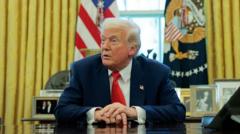Thucydides’ maxim from the 5th century B.C. — that “the strong do what they can and the weak suffer what they must” — seems to be the core of President Trump’s negotiating strategy. Herein lies the Greek tragedy. President Trump is miscalculating the odds of a win with this approach when applied to American trade policy in the 21st century.
Here are three things that Trump does well in terms of his negotiation calculations and three things that he does not understand at all.
First, Trump’s recurring negotiation tactic is that if he inflicts economic harm on the trade partners, they have no choice but to negotiate. A “win” in the trade negotiation depends on alternatives for each side. Negotiation theorists use of the term BATNA or “Best Alternative to a Negotiated Agreement” refers to the alternatives available to negotiating parties. Trump calculates that America’s 15.9 percent of total global imports, the biggest market in the world, forces countries to fall on their knees — in his own words, “kissing my ass” — to negotiate with the U.S.
Second, the politics: Trump is right that America can get a better deal from bilateral than from multilateral negotiations involving three or more countries. In bilateral negotiations, the U.S. holds better cards, to use the metaphor that Trump deployed in his contentious Oval Office meeting with Ukrainian President Volodymyr Zelensky.
Third, the valid technical part of Trump’s strategy is that he knows bilateral trade has multilateral ramifications. China is known to divert its trade through Mexico or to set up shops in Southeast Asia. Therefore, a 46 percent tariff punished Vietnam, although in such cases product-specific tariffs would be effective.
But here’s what Trump does not understand.
First, markets: Many of the alternatives in a trade negotiation depend on market conditions. The U.S. may be able to force parties to come to the table, but they hold many market cards, most of all from the global economy in which the U.S. thrives (despite Trump’s misgivings).
Look no further than the fact that worsening market conditions minimized any good cards that Trump held. Stocks slid. Treasury bonds lost their value. A financial and budgetary crisis seemed imminent. In an interconnected global economy, negotiation tools need fine-tuning, not grandiose, threatening measures. The markets increased the good alternatives for America’s trade partners in the last week.
Second, politics: International diplomacy and negotiations, in Robert Putnam’s meta












